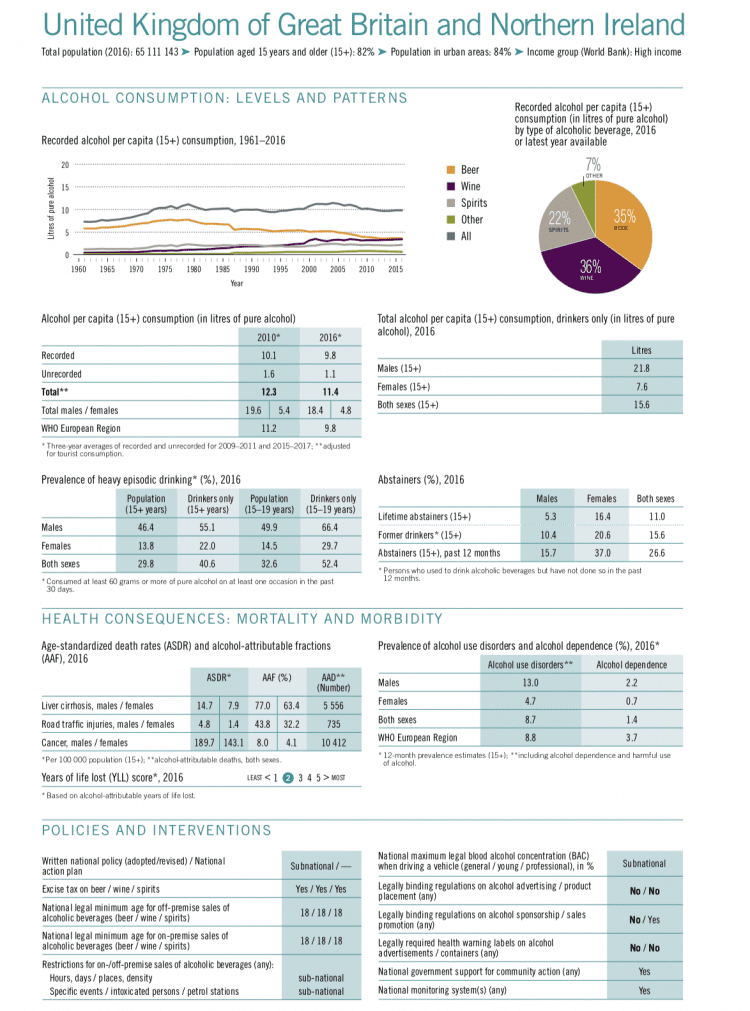UK: Big Alcohol Attacks Proven Alcohol Policy Measures
Big Alcohol attacks scientifically proven alcohol control measures that help save lives and promote health.
Alcohol is the biggest cause for Liver Disease in Europe according to the European Association for the Study of the Liver (EASL) HEPAHEALTH project. Specialists in liver disease advice:
- alcohol should carry warning labels about health risks,
- the marketing of alcohol directly to the public should be banned, and
- alcohol should be more expensive.
Following this, In the fifth report of the Lancet Standing Commission on Liver Disease in the UK, the authors ask the UK government to reintroduce the proven effective ‘alcohol duty escalator’. They also call for minimum unit pricing in UK. However the British government is not heeding any of the advice due to strong lobbying by Big Alcohol.
The UK government has refrained from introducing any alcohol tax increases, because of the political power and interference of the Big Alcohol lobby.
… it appears the lobby has more sway over government than medical opinion,” said Roger Williams, MD, from the Foundation for Liver Research in London to Medscape Medical News.
Big Alcohol forces duty escalator removal
The alcohol duty escalator which was in place from 2008, automatically increased duties by 2% above inflation every year. It was repealed for beer in 2013 and for for wine, cider, and spirits in 2014. This mechanism and the call for minimum unit pricing are recommended policy interventions by the WHO ‘SAFER’ package to curb alcohol harm.
When the duty escalator was in place, rates of mortality related to alcohol consumption improved in Scotland and, to some extent, England, an analysis of the policy showed. Immediately after the repeals, however, mortality rates started climbing.
At the time, the Escalator’s abolition was greeted with delight by the alcohol industry and with dismay by the public health community. The UK government, prime minister Cameron and Chancellor Osborne in particular, had bowed to an aggressive lobbying campaign by Big Alcohol and in a remarkable policy u-turn decided to abolish the Alcohol Duty Escalator in their 2014 Budget. In addition, they also reduced the duty on beer and froze it on spirits and ordinary cider.
According to the report, 4% of the population accounted for almost one-quarter of the alcohol industry’s sales. About 5% of the population are poor and in bad environmental situations, consuming over 100 units of alcohol per day. Researcher Williams stresses this is why a minimum unit price is necessary to curb the alcohol harm.
In Scotland, legislation that established a minimum unit price was introduced in 2012, over legal challenges launched by the Scotch Whiskey Association.
Alcohol Harm in UK
The cost of alcohol harm in the UK is estimated to exceed £21bn each year, which is more than double the total revenues collected from alcohol duties (£10bn).
The alcohol per capita consumption in the UK is relatively high compared to the WHO European region average. Heavy episodic alcohol intake is pervasive. The majority of deaths due to liver cirrhosis, and cancer is attributable to alcohol. For men in the UK alcohol use disorders also rate very high when compared with the rest of the region.
Data clearly states the health harms of alcohol. WHO has introduced the SAFER package to curb these harms and health professionals in the UK are advocating strongly for the adoption of policy interventions to increase taxes and reduce alcohol availability. Evidently Big Alcohol does not care for the lives at stake, it’s the duty of the government to step up and take action now.
We need restrictions on price, availability, and marketing; we cannot treat our way out of Scotland’s liver disease,” said Peter Rice, MD, steering group chair of Scottish Health Action on Alcohol Problems (SHAAP)
—

